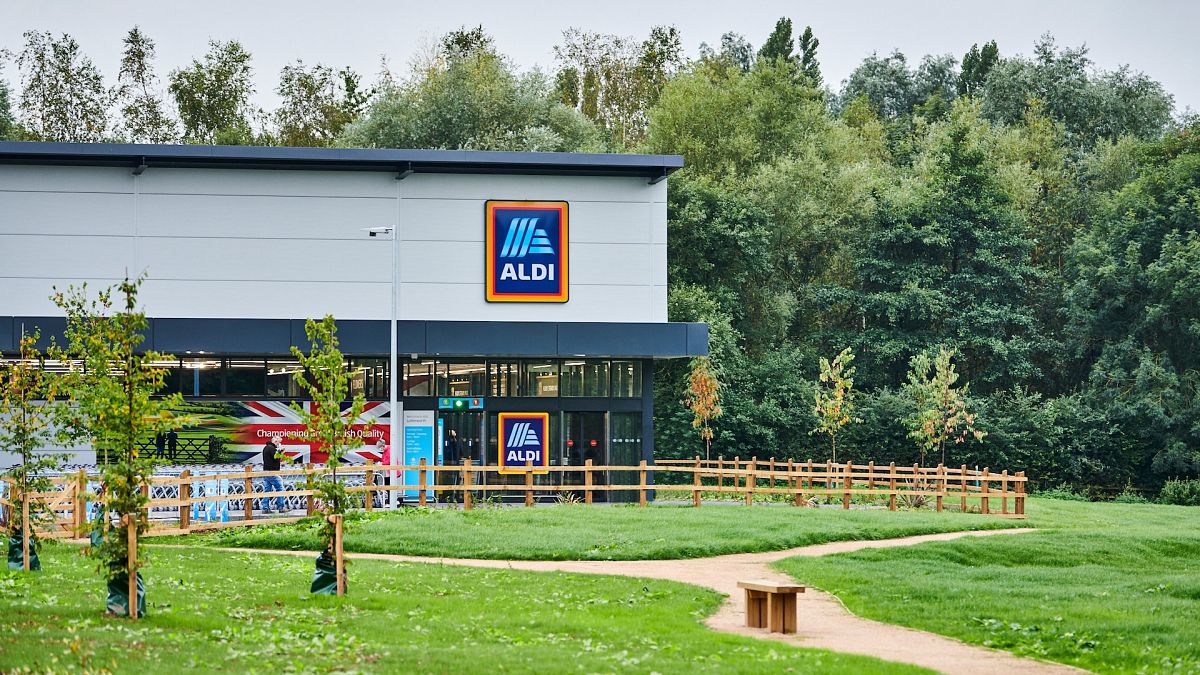High investment and low prices appear to be disrupting the established order in the UK supermarket sector.
German retailers Aldi and Lidl are stealing a march on their UK competitors with increased investment and lower prices, disrupting the established order.
Aldi is taking the fight to its UK rivals with the announcement of a record £1.4bn (€1.6) investment in new stores and lower prices.
The two-year plan is designed to accelerate its expansion across the UK and close the gap on the country’s big three players.
More than 100 existing shops will be refurbished, and 23 new stores opened by the end of the year.
The capital investment will add to Aldi’s roster of 1,020 stores and a headcount in excess of 45,000.
To help manage the supply-chain demands of supplying more stores more efficiently, Aldi plans to expand its network of 11 regional distribution centres and update the technology infrastructure underpinning its operation.
In the past three months, the retailer has invested around £100m (€89m) in price cuts for consumers, while retail staff have seen their pay boosted by a collective £79m (€94).
Increased profits driving growth
Now the UK’s fourth-largest supermarket, according to Retail Economics, Aldi is closing in on rivals Tesco, Sainsbury’s, and Asda – the top three performing retailers in the UK’s fiercely competitive supermarket sector.
Aldi’s latest annual results for the 12 months to December 2023 shows its highest ever period of sales growth – up 16% to £17.9bn (€21.4bn), compared with £15.5bn (€18.5bn) in 2022.
Giles Hurley, Chief Executive Officer for Aldi UK and Ireland, says he is focused on boosting footfall by providing value for cash-strapped consumers: “British shoppers are voting with their feet and choosing Aldi as their first-choice supermarket.
“We’re responding with our biggest ever annual investment in Britain.”
He went on: “For every £1 of profit generated last year, we’re investing £2 this year – opening more stores and building the supply infrastructure to bring high-quality, affordable groceries to millions more families the length and breadth of Britain.”
German compatriot Lidl’s fortunes are also on the up.
Now ranked the sixth-largest supermarket in the UK, Lidl has 11,000 stores in 32 countries, including more than 800 in the UK.
Consumer data company Kantar found that, for the 12-week period to 12 May 2024, Lidl’s sales rose 10.9% year-on-year, fuelled by both its in-store bakery offer and highly successful loyalty scheme.
The good news for Lidl continued with a growth in its market share to a record of 8.1%, up from 7.7% in 2023.
Lidl’s rise will be hard for UK competitors to stop
Lidl has also garnered acclaim from the UK retail sector. It was named Grocer of the Year at the UK Retail Week Awards in March.
Judges were impressed by its growth over the past 12 months and its value offering. Its community involvement, such as offering food donations, was also praised.
One judge summed up Lidl’s impact, saying: “Lidl has got a tremendous business where it’s captured a lot of market share. Unless the rest of the supermarkets do something, that’s going to continue.”
Ryan McDonnell, Lidl GB CEO, was proud of the supermarket’s achievement, saying: “We’re thrilled to be named Grocer of the Year, an especially poignant accolade with 2024 marking our 30th anniversary in Great Britain.
“When the doors to our first store opened back in 1994, our promise was simple: Offer customers great quality food at unbeatable value, and this commitment still stands.”
He added: “Big on Quality, Lidl on Price isn’t just a brand slogan. It’s a promise that epitomises what our business stands for and encapsulates our commitment to social responsibility and sustainability, which is core to our DNA.
“Over the years, this has helped contribute towards a significant change in the way that British households shop for their groceries.”
Among the top UK supermarkets, Tesco leads with a 27.5% market share and sales of £39.7bn (€47.5) in 2023, according to financial data company Moneyzine.
One of the largest retailers in the world, Tesco has more than 6,000 stores in Europe and Asia, 4,074 of which are in the UK, and employs more than 400,000 people worldwide.
Sainsbury’s, the UK’s second-largest player, follows with a 15.6% share, while Asda comes third on 13.4%.
Aldi overtook Morrisons to become the UK’s fourth-largest supermarket.
Although ranked sixth, Lidl has the financial muscle to push for the top spot. It is part of the massive German retailer the Schwarz Gruppe, a family-owned retail group operating more than 12,900 food stores, supermarkets, hypermarkets, and discount stores across 33 countries.
Lidl’s owners have the ambition, industry knowledge and deep pockets to further disrupt the UK’s supermarket sector.

